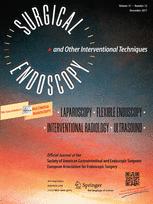Bell RC, Fox MA, Barnes WE, Mavrelis PG, Sewell RW, Carter BJ, Ihde GM, Trad KS, Dargis D, Hoddinott KM, Freeman KD, Gunsberger T, Hausmann MG, Gill BD, Wilson E
Surg Endosc. 2014 Oct;28(10):2949-58.
Background:
Preoperative factors predicting symptomatic improvement after transoral fundoplication (TF) in chronic gastroesophageal reflux disease (GERD) patients with persistent symptoms on proton-pump inhibitors (PPIs) therapy have not been elucidated fully.
Methods:
Univariate and multivariate logistic regression analyses were performed on data from 158 consecutive patients who underwent TF with the EsophyX device between January 2010 and June 2012 in 14 community centers. Variables included age, gender, body mass index, GERD duration, PPIs therapy duration, presence of hiatal hernia, esophagitis, Hill grade, quality of life scores (QOL) on PPIs, % total time pH < 4, and DeMeester score on reflux testing off PPIs.
Results:
All patients suffered from typical GERD symptoms. Additionally, 78 % (124/158) of patients suffered from atypical symptoms. Six percent (10/158) with recurrent GERD symptoms refractory to PPI therapy underwent revisional procedure (9 laparoscopic Nissen, 1 TF). Median follow-up was 22 (range 10–43) months. For patients with typical symptoms, univariate analyses revealed 4 preoperative factors predictive of successful outcomes: age ≥ 50 [odds ratio (OR) = 2.4, 95 % confidence interval (CI) = 1.2–4.8, p = 0.014], GERD Health-related Quality of Life score (GERD-HRQL) ≥ 15 on PPIs (OR = 6.0, CI = 1.2–29.4, p = 0.026, Reflux Symptom Index score > 13 on PPIs (OR = 2.4, CI = 1.1–5.2, p = 0.027), and Gastroesophageal Reflux Symptom Score ≥ 18 on PPIs (OR = 2.6, CI = 1.2–5.8, p = 0.018). Age and GERD-HRQL score remained significant predictors by multivariate analysis. For patients with atypical symptoms, only GERD-HRQL score ≥ 15 on PPIs (OR = 9.9, CI = 0.9–4.6, p = 0.036) was associated with successful outcomes.
Conclusions:
Elevated preoperative QOL scores on PPIs and age ≥ 50 were most closely associated with successful outcome of TF in patients with persistent symptoms despite medical therapy.
Link to open access file: Bell RC, et al; Surg Endosc. 2014 Oct;28(10):2949-58.


